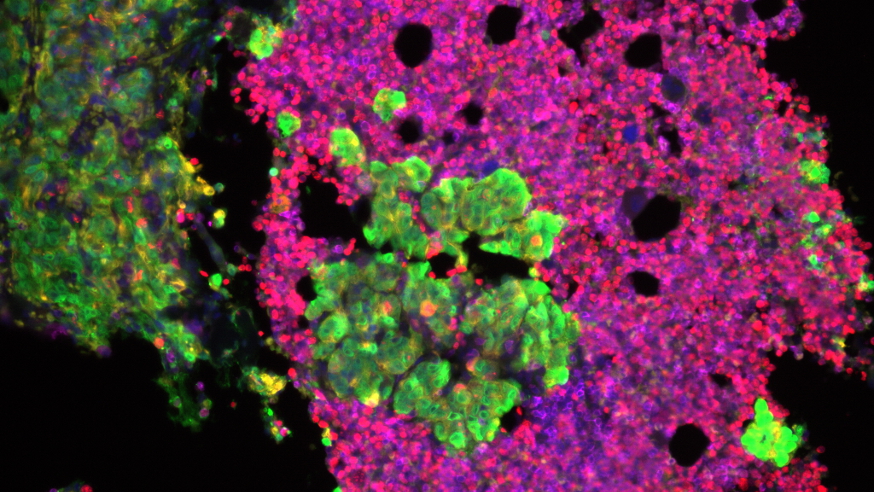
Prostate cancer cells (photo: Mateus Crespo/Professor Johann de Bono, the ICR)
Taking samples of prostate cells from all men with a family history of prostate cancer could help to identify a significant number of new cases of the disease, according to new research.
The researchers took prostate biopsies from 100 men aged 40–69 years who had a family history of prostate cancer. They found that one quarter of the men had tumours — nearly half of these were a more aggressive form of the disease, known as non-indolent prostate cancer, that required immediate treatment.
The study, published in Oncologist, also found that genetic information taken from men could help to identify those at high risk of prostate cancer.
Prostate cancer is the most common cancer in men in Europe. A parent, sibling, or child of someone with prostate cancer has approximately twice the risk of developing the disease than the general population. However, identifying high-risk individuals can be difficult.
Some patients are tested for levels of prostate-specific antigen (PSA), a protein produced by cells of the prostate. Levels can increase if a man has prostate cancer, but other conditions give a similar result and so it is not a universally successful cancer identification tool; these tests could lead to unnecessary treatment.
Genetic variations
Researchers from The Institute of Cancer Research, London, and The Royal Marsden NHS Foundation Trust, working with colleagues across the UK, tested different methods to see if targeted screening of men with family histories of prostate cancer might have a greater impact.
The took prostate biopsies — small samples of prostate cells — to test in the lab and also studied genetic variations that are more common in men with prostate cancer.
They assessed 71 different genetic variations known as single nucleotide polymorphisms, a difference in a single DNA building block. Identifying just one single change has not helped to predict an individual’s prostate cancer risk, so the researchers assessed patients with a number of different combinations of these genetic variations.
Their results found that prostate biopsy is a feasible and safe approach to prostate cancer screening in men with a family history and detects a high proportion of prostate cancer that needs radical treatment. No major side-effects or complications from having the biopsy were reported.
They also found that the patients harbouring multiple genetic mutations were more likely to have prostate cancer, although a much larger study would be needed to assess the use of genetic data as a potential screening tool.
Improved screening
Professor Rosalind Eeles, Head of the Oncogenetics Team at the ICR, who led the study, said: “We need a better way to assess an individual’s prostate cancer risk to improve screening. Current methods are not accurate and the use of tumour biopsies in high-risk men could lead to better identification and treatment.
“We are also stepping closer towards identifying a number of small genetic variations that together increase a person’s risk of prostate cancer. This will help us to use genetic tests and family history profiling to find men at the highest risk of prostate cancer.”
This work was supported by The Ronald and Rita McAulay Foundation, Cancer Research UK, The National Institute for Health Research Biomedical Research Centre at the ICR and The Royal Marsden, and other funders.